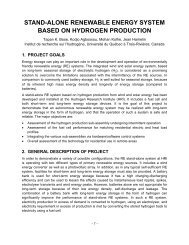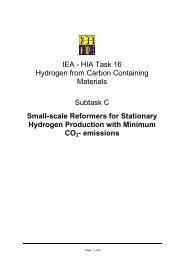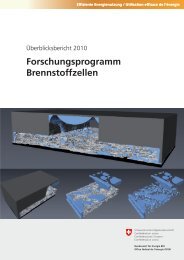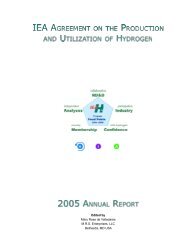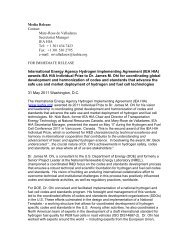Technology Status of Hydrogen Road Vehicles
Technology Status of Hydrogen Road Vehicles
Technology Status of Hydrogen Road Vehicles
You also want an ePaper? Increase the reach of your titles
YUMPU automatically turns print PDFs into web optimized ePapers that Google loves.
hydrogen engines may have lower oil costs and very slightly lower maintenance costs than gasoline engines.<br />
Generally, dual-fuel (H 2/gasoline) vehicles and engines are more efficient and have lower emissions than stock<br />
gasoline ones.....<br />
6. Safety Issues<br />
<strong>Hydrogen</strong> has a largely undeserved reputation as a particularly dangerous fuel.<br />
.......<br />
<strong>Hydrogen</strong> is more hazardous than gasoline in several ways. Like methane, it is invisible and odorless, and<br />
therefore an odorant must be added to enable detection. <strong>Hydrogen</strong> flames are very hot, yet radiate very little<br />
heat and are invisible, which makes them harder to locate, and thus harder to extinguish or to avoid. A flame<br />
colorant would make detection easier. (Odorants and colorants must not contaminate hydrides). <strong>Hydrogen</strong><br />
can ignite within a rather large range <strong>of</strong> hydrogen/air densities, from 4 to 74 % (by volume), and compared<br />
to methane or gasoline needs very little energy to ignite. However, the lower volumetric ignition limits for<br />
CH 4 and H 2 are close, and in a weak ignition source such as an electrostatic spark, there is already sufficient<br />
energy to ignite CH 4. Thus in practice, H 2 may not be much more prone to ignition than CH 4.<br />
<strong>Hydrogen</strong> has a much higher normal burning velocity than has methane or propane. This means that, given<br />
a burning, detonable mixture <strong>of</strong> hydrogen, methane or propane in a confined space, the hydrogen conflagration<br />
is more likely to detonate. However, if the mixture is not burning, is not capable <strong>of</strong> exploding or is not in a<br />
confined space, this is no longer true. Thus hydrogen is more explosive than the other fuels only in certain<br />
circumstances.<br />
Contact with LH 2 destroys human tissue. Wearing gloves reduces the risk.<br />
On a volume-<strong>of</strong>-gas basis, hydrogen has a lower explosion potential than either methane or propane; on a<br />
mass-<strong>of</strong>-fuel basis, hydrogen has the most explosion potential; but volume considerations are more pertinent<br />
to storage safety.<br />
<strong>Hydrogen</strong> fires burn very rapidly, and radiate very little heat, and thus are relatively short lived.... a person<br />
can be closer to a H 2 fire than a gasoline fire without being burned.<br />
...in a test crash <strong>of</strong> an LH 2 vehicle the fuel system remained intact....similar outcomes <strong>of</strong> on-road crashes <strong>of</strong><br />
demonstration vehicles. LH 2 tanks seem less likely than jet fuel tanks to explode when struck by lightning<br />
or punctured...this probably applies to LH 2 dewars vs gasoline tanks as well. If LH 2 does leak in a crash, it<br />
will evaporate and disperse exceedingly fast, unlike gasoline which will puddle and remain a fire hazard for<br />
much, much longer.<br />
It has been shown that hydrides are safer than gasoline tanks. Unless a continuous supply <strong>of</strong> heat is available<br />
to desorb the hydrogen, a leak from a hydride tank will be self-limiting.<br />
LH 2 refueling is expected to be automatic, fast and safe. Hydride refueling also presents no unusual hazards....<br />
.......<br />
Current technology LH 2 vehicles vent at 3-5 bar which is reached after 2-5 days. If boil<strong>of</strong>f control proves to<br />
be feasible and relatively inexpensive, then the market potential <strong>of</strong> LH 2 vehicles will not be limited by safety<br />
concerns related to boil<strong>of</strong>f.<br />
.......<br />
Assuming that advanced technology tanks will have a lock-up time <strong>of</strong> 4 days, and a boil<strong>of</strong>f rate <strong>of</strong> 1.3% per<br />
day, a vehicle that remained idle for a week would lose less than 5% <strong>of</strong> its fuel. This likely would not be<br />
45



